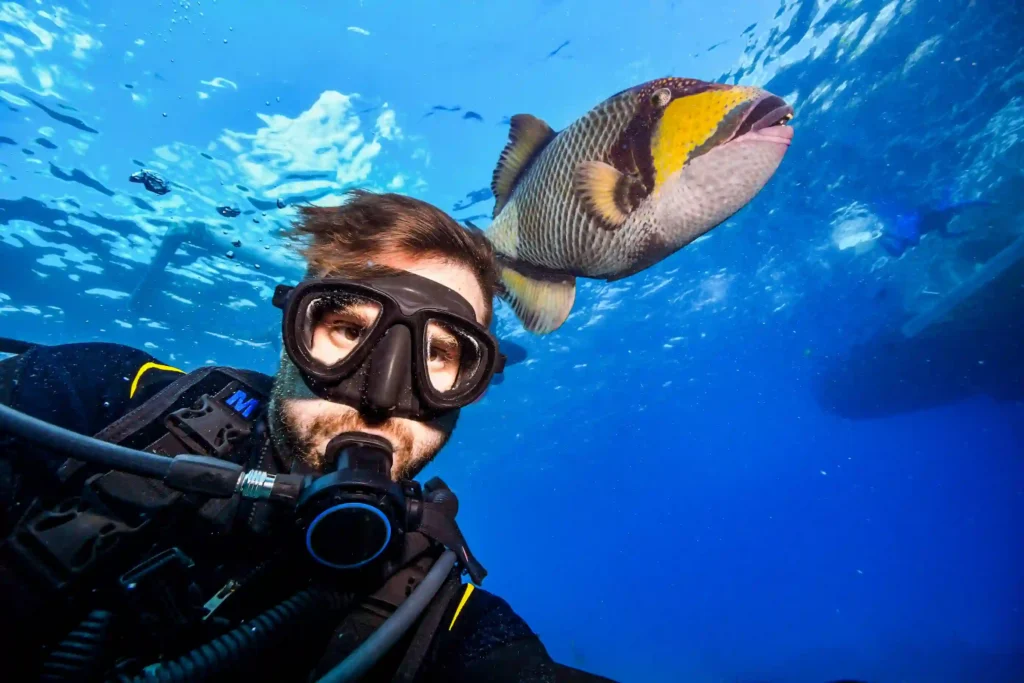Diving into the mysterious blue depths is a dream for many. If you’re curious about what’s lurking below the ocean’s surface, scuba diving is your ticket to an adventure that’s deeper than your average Netflix binge.
This guide is your one-stop shop for the basics of scuba diving, turning beginners and travel bloggers into underwater explorers extraordinaire. Whether you’re capturing your aquatic antics for the ‘Gram or just soaking in the chill vibes of marine life, this post will set you on your way to becoming a full-fledged ocean whisperer.
Table of Contents
The Allure of Underwater Exploration
The ocean, covering more than 70% of our planet, holds mysteries waiting to be discovered. Scuba diving offers an exhilarating chance to explore this vast underwater world firsthand. Imagine swimming through vibrant coral reefs and intriguing shipwrecks—natural wonders that captivate and inspire at every turn.
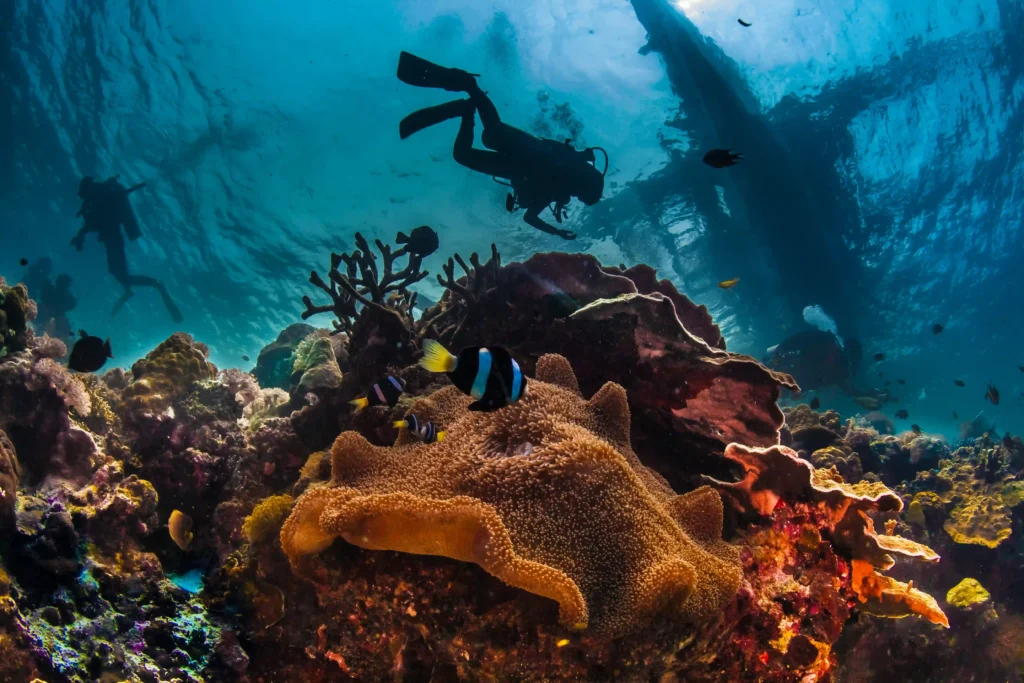
For beginners, scuba diving can be a thrilling yet daunting adventure. But with the right knowledge and preparation, anyone can dive beneath the waves and uncover the magic below. Remember, every expert diver started with that first plunge, and your scuba adventure begins with mastering the basics.
Essential Gear for Scuba Diving
Before diving into the deep blue, make sure you’ve got the gear to keep you swimming with the fishes (in the best way possible). Here’s your must-have scuba checklist!
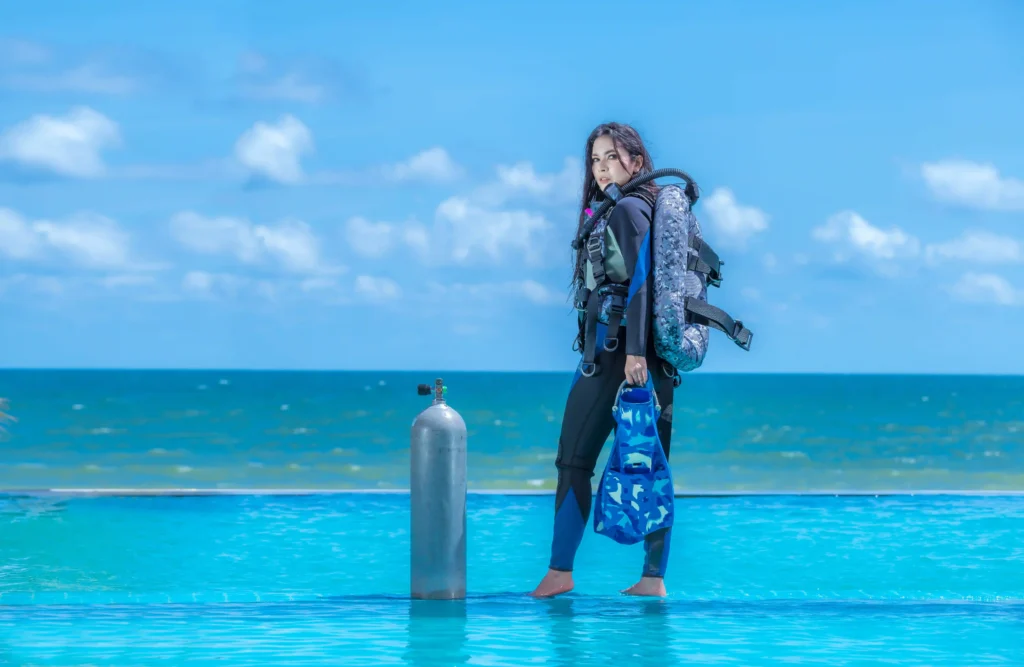
- Mask and Snorkel:
A good mask provides clear vision, while a snorkel allows you to breathe at the surface without lifting your head out of the water. Make sure the mask fits snugly to prevent leaks.
- Fins:
Fins aid in efficient movement through the water. They come in various styles, so choose ones that are comfortable and appropriate for your skill level.
- Wetsuit or Dry Suit:
Depending on the water temperature, you’ll need a wetsuit or dry suit to keep you warm. Wetsuits are ideal for warmer waters, while dry suits are suited for colder conditions.
- Buoyancy Control Device (BCD):
The BCD allows you to control your buoyancy, enabling you to float, ascend, or descend effortlessly. It’s a critical piece of equipment for safe and enjoyable dives.
- Regulator:
This device delivers air from your tank to your mouth. It’s crucial to choose a reliable regulator, as it ensures you can breathe easily underwater.
- Dive Computer:
A dive computer tracks your depth, time underwater, and decompression limits, helping you avoid potential hazards.
Having the right gear is essential for a safe and enjoyable scuba experience. Investing in quality equipment and ensuring it fits correctly will make your dives much more comfortable and secure.
Safety Guidelines for Divers
Safety is the unsung hero of scuba diving. Nail those safety protocols, and your underwater escapades will be as thrilling as a dolphin’s day out, minus the risks. Dive into these essential safety tips:
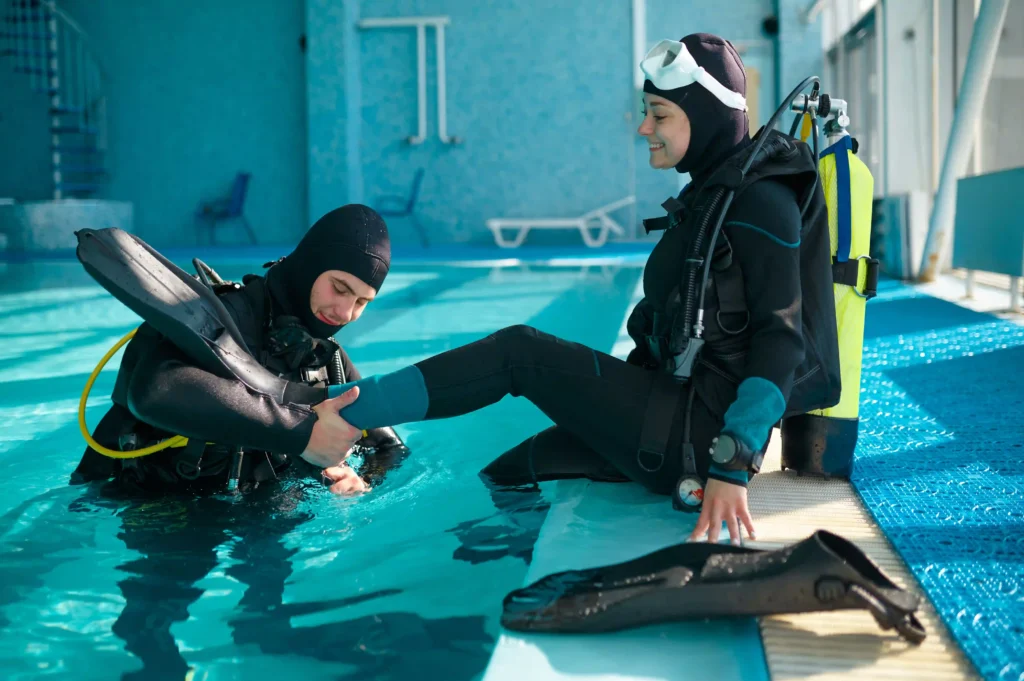
- Get Proper Training:
Enroll in a certified scuba diving course to learn the basics from a professional instructor. Training covers essential skills, safety procedures, and emergency response techniques.
- Dive with a Buddy:
Always dive with a partner. Having a buddy increases safety by providing mutual support and assistance during the dive.
- Plan Your Dive:
Before entering the water, plan your dive. Discuss the depth, duration, and route with your buddy. Use the acronym BWRAF (BCD, Weights, Releases, Air, Final check) as a pre-dive safety check.
- Monitor Your Air Supply:
Keep a close eye on your air gauge and never push your limits. Ascend with at least 500 psi (pounds per square inch) remaining in your tank.
- Ascend Slowly:
Ascend at a controlled, slow pace to avoid decompression sickness, commonly known as “the bends.” Follow the rule of ascending no faster than 30 feet per minute.
- Stay Aware of Your Surroundings:
Keep an eye on your surroundings to avoid potential hazards like sharp corals, underwater currents, and marine life.
Adhering to these safety guidelines will help ensure a positive and secure scuba experience, allowing you to fully enjoy the beauty of the underwater world.
Choosing the Right Diving Location
Selecting the right location for your first dives is crucial. Here are key factors to consider:
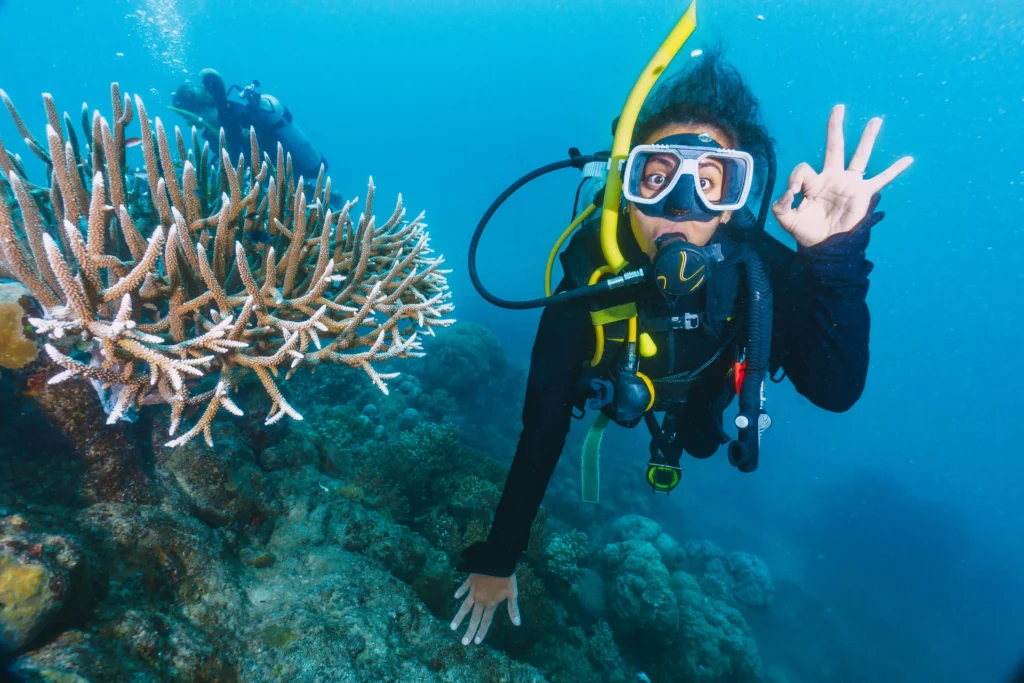
- Water Conditions:
Look for locations with calm, clear waters. Good visibility makes it easier to explore and reduces the risk of getting lost or disoriented.
- Marine Life:
Choose a site known for its rich and diverse marine life. Encounters with colorful fish, sea turtles, and coral gardens will make your experience unforgettable.
- Accessibility:
Opt for easily accessible locations, especially if you’re new to scuba diving. Many popular destinations have facilities and services tailored for beginners.
Some beginner-friendly scuba destinations include the Great Barrier Reef in Australia, the Caribbean’s crystal-clear waters, and the Red Sea in Egypt. These locations offer stunning underwater landscapes and excellent conditions for novice divers.
First-Time Diving Experience
Your first scuba dive is an exhilarating adventure. Here’s a step-by-step guide to help you prepare and make the most of it:
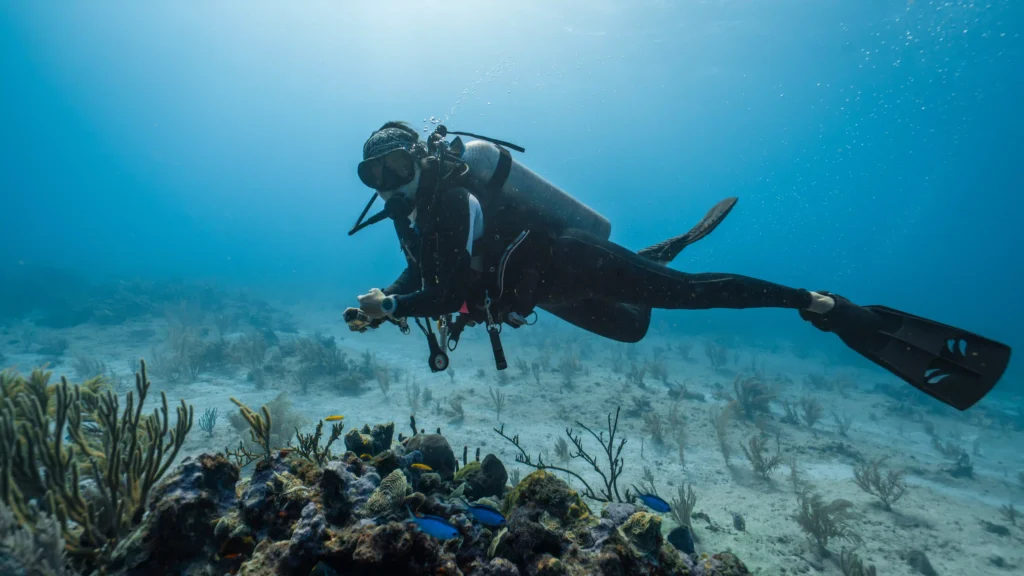
- Preparation:
Start by completing your training and getting familiar with your equipment. Practice putting on your gear and breathing through the regulator in shallow water.
- Entry:
Enter the water slowly, either by walking in from the shore or using a controlled descent from a boat. Stay close to your instructor or buddy for guidance.
- Descent:
Descend gradually, equalizing the pressure in your ears frequently to avoid discomfort. Focus on breathing slowly and calmly through your regulator.
- Exploration:
Once you’re underwater, take your time to look around and enjoy the surroundings. Move slowly and deliberately, using your fins to propel yourself gently.
- Return:
When it’s time to ascend, follow your plan and ascend slowly. Perform a safety stop at around 15 feet for three minutes to allow your body to adjust.
This structured approach ensures a smooth and enjoyable first-time scuba experience. Remember to communicate with your buddy or instructor throughout the dive.
Environmental Awareness
Scuba divers have a unique role in protecting marine ecosystems. Here’s how you can contribute to environmental conservation:
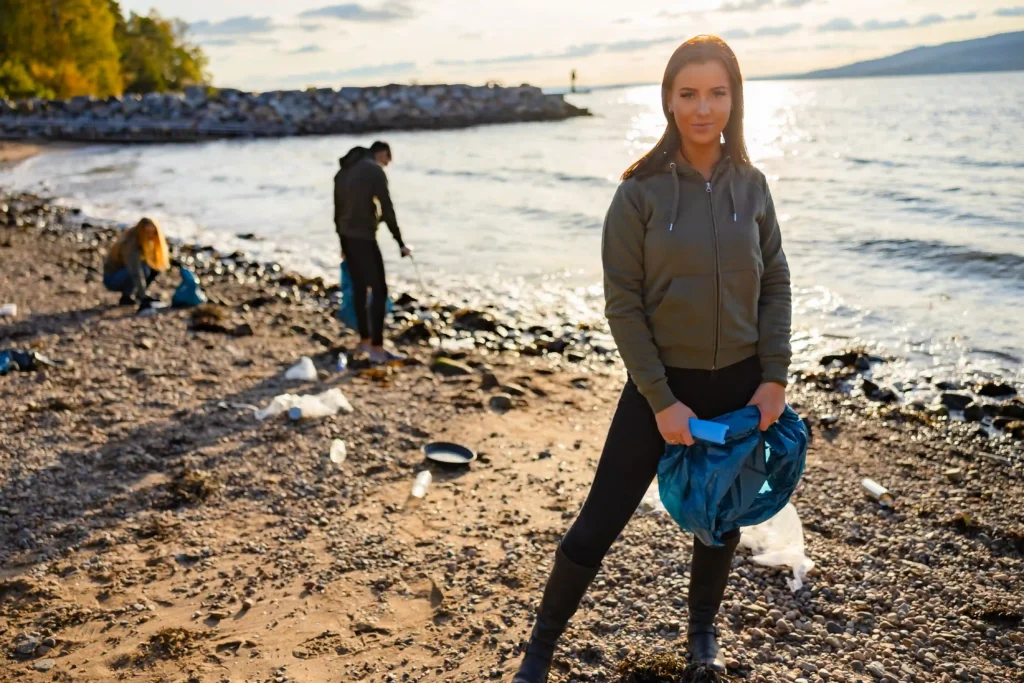
- Respect Marine Life:
Observe marine life from a distance and avoid touching or disturbing animals and plants. Many species are delicate and can be harmed by human contact.
- Avoid Littering:
Never leave trash in the water. Marine debris can be deadly to wildlife. Participate in underwater clean-up activities if possible.
- Choose Eco-Friendly Products:
Use reef-safe sunscreen and environmentally friendly gear. Some sunscreens contain chemicals harmful to coral reefs, so opt for biodegradable options.
- Support Marine Conservation Efforts:
Engage with organizations dedicated to marine conservation. Volunteering, donating, or spreading awareness can make a significant impact.
Being mindful of the environment ensures that future generations can enjoy the same underwater beauty. Your actions as a diver help protect the ocean and its inhabitants.
The Advantages of Scuba Diving
Scuba diving isn’t just about exploration—it offers numerous benefits that enhance your well-being:
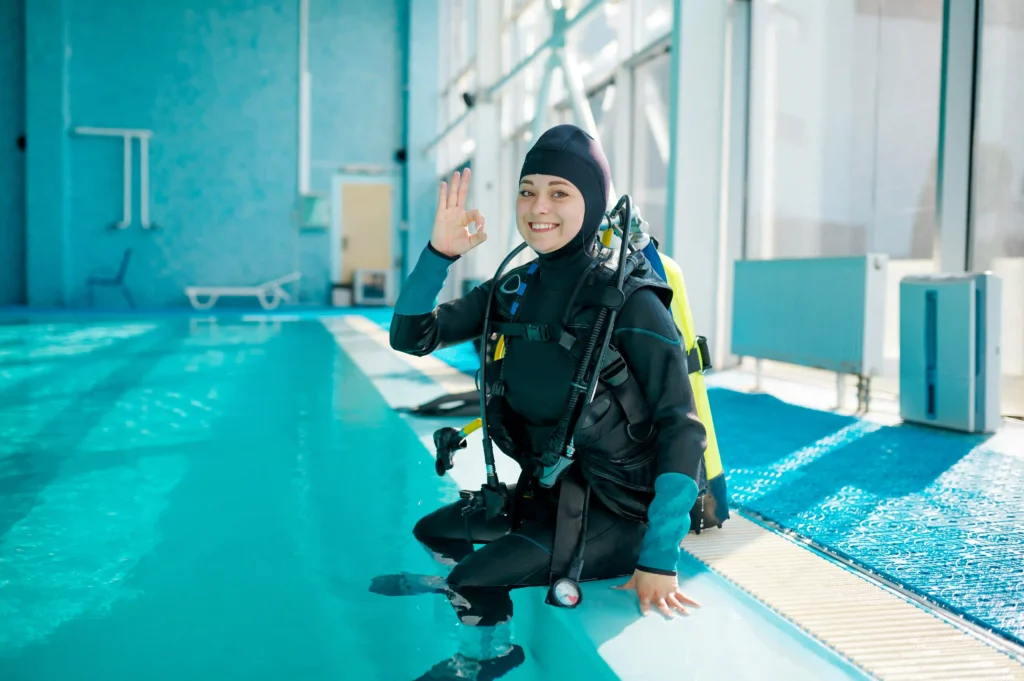
- Health and Fitness:
Diving is a great form of exercise. It strengthens your muscles, improves cardiovascular health, and boosts overall fitness levels.
- Stress Relief:
The underwater world is tranquil and serene. Diving helps reduce stress and anxiety, providing a sense of peace and relaxation.
- Unique Experiences:
Every dive is a new adventure. From exploring hidden caves to swimming with dolphins, scuba diving offers experiences you won’t find anywhere else.
These benefits make scuba diving a rewarding activity that goes beyond the thrill of exploration. It’s a holistic experience that contributes to physical and mental well-being.
Conclusion
Scuba diving is your ticket to adventure and discovery. By getting the hang of scuba basics, grabbing essential gear, sticking to safety tips, and picking the right spots, you can really make the most of your underwater adventures.
Don’t forget the importance of environmental awareness and all the benefits scuba diving brings. Whether you’re just starting out or a travel blogger capturing your journeys, the underwater world has something amazing for everyone.
Frequently Asked Questions about the Basics of Scuba Diving
1. What essential equipment is needed for scuba diving?
To get started with scuba diving, you’ll need a few key pieces of equipment. This includes a mask, snorkel, fins, a buoyancy control device (BCD), a regulator, a dive computer, and a wetsuit. These items help ensure safety, comfort, and ease of movement underwater. It’s important to choose gear that fits well and suits the specific conditions of your dive location.
2. What are the safety tips for new scuba divers?
Safety is paramount in scuba diving. Always dive within your limits and skills, and never dive alone. Keep a close eye on your air supply and dive time. Ascend slowly to avoid decompression sickness, and always perform a safety stop. Take weather and water conditions into account, and ensure your equipment is properly maintained. Lastly, keep up-to-date with your diving skills through continuous learning and practice.
3. Where are some beginner-friendly dive locations?
There are numerous locations ideal for beginner divers. The Great Barrier Reef in Australia offers vibrant marine life and clear waters. The Caribbean, with places like Cozumel and the Bahamas, provides warm waters and excellent visibility. Closer to the USA, Florida’s Key Largo and Hawaii’s Kailua-Kona are fantastic for beginners, offering calm waters and an abundance of sea life to observe.
4. What are the certification requirements for scuba diving?
To scuba dive safely, obtaining a certification is essential. The most common introductory certification is the Open Water Diver, offered by organizations like PADI or SSI. The course involves classroom study, pool sessions, and open water dives. Certification ensures you understand the basics of diving, safety protocols, and equipment handling. It is recognized worldwide, enabling you to dive in various locations.
5. What challenges might new divers face and how can they overcome them?
New divers often face challenges such as buoyancy control, equalizing pressure, and managing anxiety. Buoyancy control can be improved with practice and proper use of the BCD. Equalizing pressure is crucial to avoid discomfort and should be done gently and frequently. To manage anxiety, practice relaxation techniques and gradually increase dive complexity. Regular practice and experience are key to overcoming these initial hurdles.
6. Why is scuba diving training important?
Training is vital in scuba diving to ensure safety and competence underwater. It teaches you how to handle equipment, manage potential emergencies, and understand the underwater environment. Proper training builds confidence, allowing you to fully enjoy the underwater world while minimizing risks.
7. What are the benefits of scuba diving as a recreational activity?
Scuba diving offers numerous benefits, including the opportunity to explore diverse marine ecosystems and witness breathtaking underwater landscapes. It promotes physical fitness, as it involves swimming and carrying equipment. Diving can also be a meditative experience, reducing stress and enhancing mental well-being. Additionally, it fosters a sense of adventure and exploration, making it a rewarding recreational activity.
By understanding these basics, new divers can set out on a safe and enjoyable scuba diving journey.
